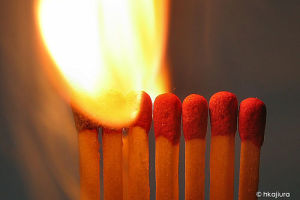A Northbrook woman was charged with residential arson for allegedly setting fire to the second floor of the home she shared with her mother. Neither the defendant nor her mother were home when the fire broke out.
Defense of Chicago Residential Arson
Residential arson has two elements that must be proven in order to gain a conviction. First, the prosecution must prove that the defendant knowingly, by either fire or explosive, damaged real property valued at $150 or more without the owner’s consent.
If arson is proven, the next step in proving residential arson is to show that the defendant knowingly damaged, in whole or in part, any building that is another person’s home. The defendant can be charged with residential arson even if he lives in the home as well – so saying “It is my home, I can burn it if I want” is not a viable defense if the home is shared by anybody else.
But that raises element of residential arson, which is proving that any other people in the home actually lived there. For example, if it can be proven in this case that the defendant owned the home and her mother was merely visiting her, then she could not be charged with residential arson since she did not damage the property of another – she damaged her own property.
It is also necessary to prove the amount of damages caused by the fire. If the damage was less than $150 then there can be no arson charge. A damages determination would also require a review of the home’s condition prior to the fire, in order to ascertain how much damage was caused by the fire versus how much damage was present before the fire.
Any arson defense requires an extensive investigation into the cause of the fire. The police and fire department, and possibly a homeowner’s insurance agent, would investigate and prepare a report on the fire’s origins. In addition to reviewing these reports, an independent investigation by forensic experts is also useful to get an unbiased third-party opinion on the possible causes of the fire. David L. Freidberg has a team of forensic experts at his disposal that can assist in this investigation.
Because an arson charge requires that the defendant knowingly set the blaze, an independent investigation can help determine possible causes for the fire that were purely accidental, rather than purposeful. Such causes may include:
- Faulty wiring;
- A smoldering cigarette;
- A cooking appliance left plugged in and turned on, such as a hot pot;
- Space heater or lamp tipping over;
- Clothing or other object left on a radiator, space heater, hair dryer, or other heating device;
- Fireplace fire not properly extinguished;
- Large appliance, such as a television or computer, crashing and igniting;
- Grease fire from cooking appliance, or;
- Overloaded outlets.
If it can be shown that the fire began as a result of any of these scenarios, then it can be argued that the defendant did not knowingly set the fire, and as a result could not be found guilty of committing arson.
Chicago Arson Attorney
If you have been charged with arson of any type, contact the Law Offices of David L. Freidberg immediately. With close to 20 years’ experience as a Chicago arson attorney, Mr. Freidberg understands the nuances of each category of arson and will thoroughly examine all of the evidence to find any holes in the prosecution’s case that could result in acquittal or a dismissal of charges. We serve clients in Chicago and the surrounding suburbs from three office locations in Chicago, Skokie and DuPage County. Call us today at 312-560-7100 to schedule a free initial consultation. Somebody is available to take your call 24/7.
Photo Credit: Herbert Kajiura via Compfight cc
 Chicago Criminal Lawyer Blog
Chicago Criminal Lawyer Blog



